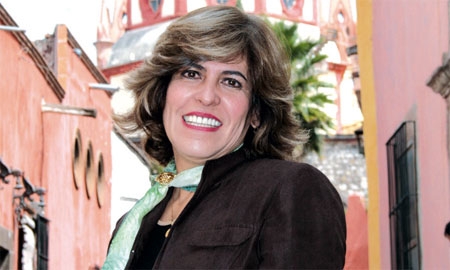Today, it is more famous as an artist and writers’ colony, houses several art and cultural institutes, and has become a favorite retirement destination for foreigners. Its historic downtown, together with the nearby Sanctuary of Atotonilco (considered the ‘Sistine Chapel of Latin America’), has been declared a UNESCO World Heritage Site.
Beyond its charm, San Miguel de Allende is a 160,000-person strong business-savvy municipality located in Guanajuato, a state known for its agriculture, petroleum industry, mining, metalwork, and assembly plants. Here, municipal president Luz Maria Nuñez Flores discusses her city and state’s competitive advantages.
How have San Miguel de Allende and the state of Guanajuato contributed to positioning Mexico as a world economic power?
The policies that we’ve carried out here in the municipal government have enhanced security for foreign investments, thereby generating acceptance from countries in Europe, Latin America and the Middle East. The state of Guanajuato has created a source of income through new companies, such as General Motors and other multinational businesses who’ve recently established themselves here. This generates employment and wealth for the state and for the nation.
What are some of the main drivers of Guanajuato’s growth in the last few years?
Guanajuato is the only state with the marvelous fortune of having two World Heritage Sites: the city of Guanajuato and San Miguel de Allende. Clearly, tourism is big here thanks to the wealth of these two cities.
In the industrial corridor, on the other hand, there is a lot of activity among both local and foreign businesses. Here we have an important dairy industry. There’s also a company that produces and exports 35 tons of mushrooms daily, making it a leader in Latin America.
San Miguel de Allende has become renowned as a preferred location for a second home and for retirement. How does the city deal with such high numbers of expats?
Since World War II, there’s been a huge surge in the number of North Americans coming to live here. The weather is marvelous, the houses are beautiful, and there are two art schools, which have generated an interesting cultural movement.
A quarter of San Miguel’s population is foreign, mostly Canadians and Americans. We’ve also got plenty of Europeans and South Americans. There are 70 different nationalities registered here, making this a very cosmopolitan city, thanks to the cultural exchanges. Consequently, the Sanmiguelenses have become quite protective of their traditions.
We work closely with a security council for foreigners and we publish crime statistics on the Internet. We’re opening the data up to the citizenry so they can see the real statistics. This clear management of information has allowed us to become the first municipal government in Mexico to open a bilingual, specialized public ministerial agency. This helps our foreign residents to feel comfortable with government procedures and to file complaints in their own language.
Recently, the Canadian Prime Minister visited and he commented that this is the first foreign municipality he’s visited where his compatriots have no complaints. On the contrary, they’re pleased with the public services.

0 COMMENTS